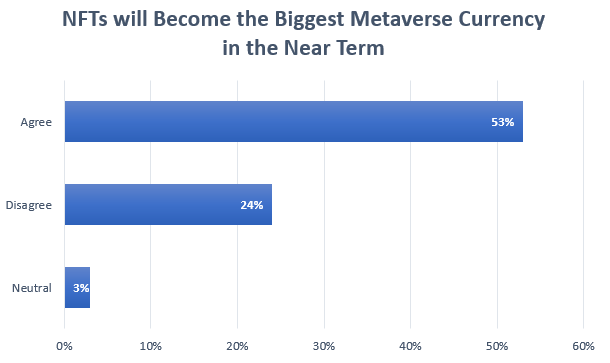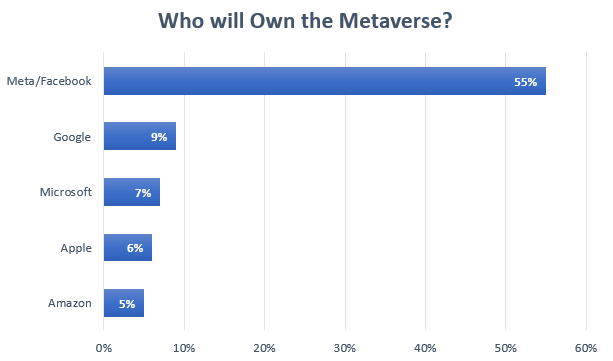Real-time engagement application programme interface (API) firm Agora has outlined in a survey the latest market sentiment on the future of the Metaverse.
The Santa Clara-based firm surveyed 300 software developers to gather information on numerous topics related to the Metaverse, the upcoming communications platform combining the Internet and spatial computing.
The company currently works with some of the world’s top Metaverse and tech firms, including HTC VIVE, Unity Technologies, and Hewlett-Packard (HP), among many others.
Tony Zhao, Founder and Chief Executive for Agora, said that the rising digital frontier offered a “great opportunity” for software developers, adding their skills and expertise were “more relevant and urgent than ever before.”
Explaining further, he stated,
“Our study’s results are a snapshot of how developers feel about the metaverse, why it has become arguably the biggest trend today and what they think the future looks like. Since they will be positioned on the front lines of practically every development that takes place in the metaverse, their thoughts and opinions ultimately carry a great deal of weight”
Here are some of the top statistics and themes presented from the survey, which offer a snapshot into the future of human connectivity.
Data Privacy
Biggest hurdles to the Metaverse. Infographic: Agora Inc
One of the biggest challenges for the virtual frontier, the survey found 33 percent of respondents said the Metaverse would raise concerns for data privacy and security.
Further issues included interoperability, disinformation and hate speech, community building, and accessible tools for software developers at 12 percent, 10 percent, and 10 percent, respectively.
Zhao added that it was “not surprising” that developers responded security had become a “major headache in the evolution of the metaverse.”
Gaming and Entertainment to Top the Metaverse
The survey also noted that the sectors set to profit the most from the Metaverse were gaming and entertainment at 26 percent each, with telecommunications, retail and e-commerce, and healthcare reaching 12 percent, 11 percent, and 6 percent, respectively.
Design, workforce, manufacturing, and education each earned 5 percent of the Metaverse market share.
72 percent of all respondents also said real-time engagement would allow the Metaverse to build greater engagement and connectivity, with 5 percent disagreeing and 22 percent remaining neutral.
Metaverse to Host Future Social Interactions
The survey also found that over half of respondents, or 55 percent, also believed the Metaverse would likely replace real-life social interactions, with 30 percent stating it was unlikely and 15 neutral.
Zhao added in-person interactions were already “dwindling today” and that, inside the Metaverse, “growing technology is already making social experiences even better and more desirable” due to advancements in XR technologies.
He concluded: “So if things continue at the current rate, there’s a very real chance that the metaverse could mark the center of future human interaction.”
The Metaverse Economy
Respondents also underscored the growing digital economy fuelling the development and monetisation of the Metaverse, with 53 percent expecting NFTs to rise as the biggest form of currency in the virtual world, 24 percent disagreeing, and 23 percent feeling neutral.
 57 percent also said people would visit the Metaverse for buying, selling, storing, and trading their cryptocurrencies, compared to 18 percent of people who disagreed and 25 percent remaining neutral.
57 percent also said people would visit the Metaverse for buying, selling, storing, and trading their cryptocurrencies, compared to 18 percent of people who disagreed and 25 percent remaining neutral.
70 percent also agreed that advancements in cryptocurrency and the blockchain were vital to the platform’s success, compared with 9 percent stating no and 21 feeling neutral.
One Platform the Rule Them All?
Amid the current hype over which firms would own the largest share of the Metaverse, 55 percent of developers surveyed believed Meta Platforms would govern the virtual landscape.
Firms such as Google, Microsoft, Apple, and Amazon topped the survey at 9 percent, 7 percent, 6 percent, and 5 percent, respectively.
Despite this, roughly 25 percent said a single company would not control the Web3-based platform, matched by a further 25 percent stating Meta Platforms would continue to dominate. Google, Microsoft, Apple, and Amazon followed at 15 percent, 12 percent, 8 percent, and 7 percent, the survey concluded.
 The news comes amid a massive wave of investment in the Metaverse as a viable solution for enterprise demands, which included funding from companies such as Accenture, Meta Platforms, NVIDIA, Microsoft, Qualcomm, NexTech AR, HTC VIVE, and many others.
The news comes amid a massive wave of investment in the Metaverse as a viable solution for enterprise demands, which included funding from companies such as Accenture, Meta Platforms, NVIDIA, Microsoft, Qualcomm, NexTech AR, HTC VIVE, and many others.
Numerous governments, including Barbados, Croatia, the United Kingdom, China, South Korea, The United Arab Emirates, Saudi Arabia, Catalonia, Japan, and many others have begun developing their own Metaverse infrastructure, which includes embassies, physical telecoms equipment, and digital real estate, among others.

